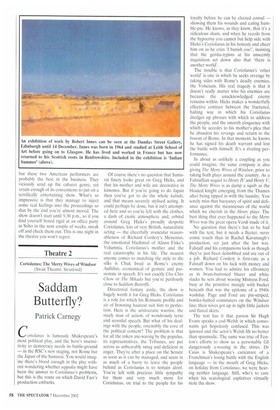Theatre 2
Coriolanus; The Merry Wives of Windsor (Swan Theatre, Stratford)
Saddam Butterfly?
Patrick Carnegy
Coriolanus is famously Shakespeare's most political play, and the hero's insensitivity to democracy needs its battle-ground — in the RSC's new staging, not Rome but the Japan of the Samurai. You would imagine there's blood enough in the play without wondering whether seppuku might have been the answer to Coriolan us's problems, but this is the route on which David Farr's production embarks.
Of course there's no question that Samurai finery looks great on Greg Hicks, and that his mother and wife are decorative in kimonos. But if you're going to do Japan then you've got to do the whole kabuki, and that means severely stylised acting. It could perhaps be done, but it isn't attempted here and so you're left with the clothes, a dash of exotic atmosphere and, orbital around Greg Hicks's proudly despotic Coriolanus, lots of very British, naturalistic acting — the cheerfully avuncular reasonableness of Richard Cordery's Menenius, the emotional blackmail of Alison Fiske's Volumnia, Coriolanus's mother and the real catastrophe in his life. The nearest anyone comes to matching the style to the silks is Chuk Iwuji as Rome's enemy Aufidius, economical of gesture and passionate in speech. It's not exactly Chu Chin Chow or The Mikado but you're perilously close to Saddam Butterfly.
Directorial fantasy aside, the show is hugely worth it for Greg Hicks. Coriolanus is a role for which his Romanic profile and air of frowning hauteur suit him to perfection. Here is the aristocratic warrior, the steely man of action, of wondrously terse and scornful speech. But what of his dealings with the people, ostensibly the core of the political content? The problem is that for all the token axe-waving by the populus, its representatives, the Tribunes, are put across as unbearably smug and deficient in anger. They're after a place on the Senate as soon as it can be managed, and seem in as much of a hurry to leave the people behind as Coriolanus is to remain aloof. You're left with precious little sympathy for them and very much more for Coriolanus, on trial to the people for his loyalty before he can be elected consul — showing them his wounds and eating humble-pie. He knows, as they know, that it's a ridiculous sham, and when he recoils from the hypocrisy you cannot but help side with Hicks's Coriolanus in his honesty and cheer him on as he cries 'I banish your , insisting that the geisha-typists at his unseemly inquisition set down also that 'there is another world'.
The trouble is that Coriolanus's 'other world' is one in which he seeks revenge by taking sides with Rome's deadly enemies. the Volscians. His real tragedy is that it doesn't really matter who his enemies are because the unacknowledged enemy remains within. Hicks makes a wonderfully effective contrast between the fractured, halting way in which his Coriolanus dredges up phrases with which to address the people, and the smooth eloquence with which he accedes to his mother's plea that he abandon his revenge and return to the bosom of Rome. In that moment, he knows he has signed his death warrant and lost the battle with himself. It's a riveting performance.
In about as unlikely a coupling as you could imagine, the same company is also giving The Merry Wives of Windsor, prior to taking both plays around the country. As a Falstaffian sequel to Henry IV and Henry, V, The Meny Wives is as damp a squib as the bloated knight emerging from the Thames after being tipped in with the laundry. You sorely miss that buoyancy of spirit and defiance against the meannesses of the world which we cherish in the Henry plays. The best thing that ever happened to the Merry Wives was the great opera Verdi made of it.
No question that there's fun to be had with the text, but it needs a fleeter, surer comic touch than in Rachel Kavanaugh's production, set just after the last war. Falstaff and his companions look as though they've just been demobbed and are out of a job. Richard Corder}, is first-rate as a Falstaff down on his luck with money and women. You had to admire his effrontery as in brass-buttoned blazer and white slacks he sets about wooing Mistress Ford, busy at the primitive mangle with bucket beneath that was the epitome of a 1940s washday. Page and Ford are pin-striped, bowler-hatted commuters on the Windsor line; their wives got up in tight little jackets and flared skirts.
The text has it that parson Sir Hugh Evans speaks a cod-Welsh in which consonants get hopelessly confused. This was ignored and the actor's Welsh lilt no better than spasmodic. The same was true of Fenton's efforts to show us a personable GI dangerously a-wooing in the shires. Dr Caius is Shakespeare's caricature of a Frenchman's losing battle with the English language — in the mouth of Greg Hicks, on holiday from Coriolanus, we were hearing neither language. Still, who's to care when his scatological expletives virtually stole the show.










































































 Previous page
Previous page